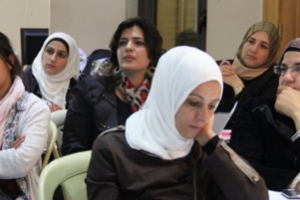
Hala Khdeer, TDA trainer and former Executive Director of the Syrian League for Citizenship, speaks to TDA on the opportunities and obstacles for women’s political participation in Syria. Khdeer led a 15-session series on women’s political empowerment organized by TDA in northern Syria.
According to TDA research, 64 percent of Syrian men and 49 percent of women believe that women who are able to work competently in important positions are scarce, and only 37 percent of Syrian men would vote for a female candidate for the position of local council chairperson, compared to 68 percent of women.
Hala Khdeer wants to change that. Trained on issues of citizenship, gender, and political empowerment, Khdeer recently worked with TDA to lead a 15-session series of workshops on women’s political empowerment. The sessions were attended by 20 women from different regions in northwestern Syria and various social backgrounds, including local activists, displaced women, and survivors of detention .
According to Khdeer, the most significant obstacles preventing Syrian women from participating effectively in politics are male authority, totalitarian systems of government, discriminatory laws, electoral regulations, and the socialization of women.
The 15 sessions, which were held from November 2020 to February 2021, targeted women based in Azaz, Jarablus, Atareb and Al-Bab. They touched on three main axes; the concept, principles and issues of citizenship, such as democracy, human rights, elections, the constitution, and civil society; the concept and issues of gender; and the participation of women in political life.
To enhance their political participation in Syria, says Khdeer, Syrian women should be aware of the importance of their political participation and of its effectiveness over the process of change, from defending women’s issues in particular to citizenship issues in general, leading to a state of citizenship.
To achieve this, Khdeer stressed the importance of what TDA is striving to do: organizing training courses on citizenship, women’s rights and political empowerment; establishing alliances and communication networks to exchange pre- and post-conflict experiences in this field; and awareness-raising campaigns focusing on the importance of women’s political participation and its impact on the process of change.
She added: “Women cannot achieve gender balance alone. There are essential points men should be made aware of regarding women’s political empowerment; such as changing the stereotype of women in men’s minds, and educating them on the importance of women’s political participation in the process of change leading to a state of citizenship. This is done through training courses on citizenship, gender, women’s rights and on involving women in the planning, implementation and evaluation of projects in civil society organizations; thereby making the impact of women’s participation in these projects tangible for men, enhancing their awareness of the importance of women’s political participation”.
As for the role of society in helping to achieve all this, from CSOs to donor countries and their agencies, Khdeer stressed the need to consecrate a principle of quotas in decision-making positions within CSO structures, to support alliances and communication networks, to implement awareness and support campaigns for female candidates in local councils and other areas of work in public affairs; and to raise awareness on the importance of women participating in elections and running for leadership positions, whether in civil society organizations or government institutions.
Meanwhile, Nadia Al-Zaidan, feminist activist trained in gender-based violence issues and a participant in the awareness sessions, said she felt the impact of these sessions in the discussion and interaction and exchange of experiences, and a harmony amongst the women as they shared their different stories.
Al-Zaidan added that numerous topics and issues were addressed in the sessions, such as citizenship, democracy, human rights, and others which constitute a cornerstone for empowering women to participate in political and human rights work. These sessions, according to Al-Zaidan, contribute to building a solid base for women to grow and freely express themselves and their personal experiences.
